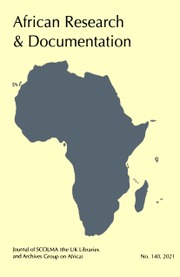Article contents
What is in a name? Ghanaian Personal Names as Information Sources
Published online by Cambridge University Press: 25 April 2022
Extract
Naming is a universal cultural practice and in every society, names are given to children at birth. According to Wegryn (2008), a name is of distinction, chosen, conferred and announced. However, the way names are given, reasons for choice of particular names and the rituals involved in naming, vary from society to society. Birth is regarded among most African societies as the beginning of the rites of passage, which comprise birth, puberty, marriage and death, and all these are celebrated to show their significance. Among most Ghanaian communities, the newborn baby is kept away from public view for seven days and brought out on the eighth day during what is called the “outdooring ceremony”.
- Type
- Articles
- Information
- Copyright
- Copyright © African Research & Documentation 2011
References
- 5
- Cited by




